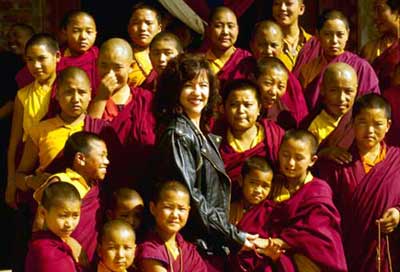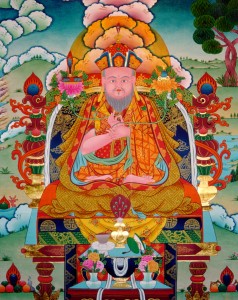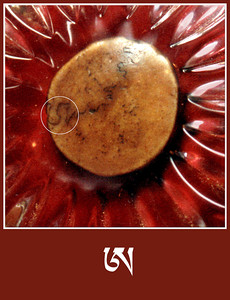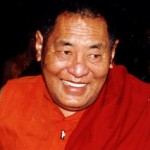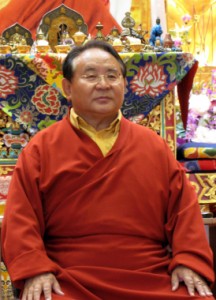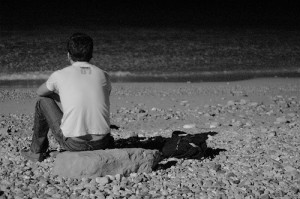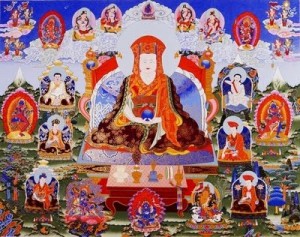
The following is respectfully quoted from “The Jewel Ornament of Liberation” by Gampopa, as translated by Khenpo Konchog Gyaltsen Rinpoche:
Six subjects describe the details of action bodhicitta. The summary:
Reflection on the faults and virtues
Definition, classification,
Increase, perfection, and
Result —
These seven comprise the perfection of generosity.
I. Reflection on the Faults and Virtues. Those who have not practiced generosity will always suffer from poverty and usually will be reborn as a hungry ghost. Even if reborn as a human and so forth, they will suffer from poverty and a lack of necessities. The Condensed Perfection of Wisdom Sutra says:
The miserly will be born in the hungry ghost realm.
In case they are born human, at that time they will suffer from poverty.
The Discourse on Discipline says:
The hungry ghost replied to Nawa Chewari,
“By the power of stinginess.
We did not practice any generosity.
So, we are here in the world of hungry ghosts.”
Without the practice of generosity, we cannot benefit others and, so, cannot achieve enlightenment. it is said:
Without the practice of generosity, one will have no wealth.
So, without wealth one cannot gather sentient beings,
To say nothing of achieving enlightenment.
On the other hand, one who practices generosity will have happiness through wealth in all different lifetimes. The Condensed Perfection of Wisdom Sutra says:
The generosity of bodhisattvas cuts off rebirth as a hungry ghost.
Likewise, poverty and all the afflicting emotions are cut off.
By acting well, one will achieve infinite wealth while in the bodhisattva’s life.
Also, the Letter to a Friend says:
One should practice generosity properly.
There is no better relative than generosity.
Again, one who practices generosity can benefit others. With generosity, one can gather trainees and then establish them in the precious Dharma. It is said:
By the practice of generosity, one can fully mature sentient
beings who are suffering.
Again, it is easier for one who has practiced generosity to achieve unsurpassable enlightenment. The Bodhisattva Basket says:
For those who practice generosity, achievement of enlightenment
is not difficult.
The Cloud of Noble Jewels Sutra says:
Generosity is the enlightenment of the bodhisattva.
The Householder Drakshulchen-Requested Sutra alternatively explains the virtues of generosity and the faults of not giving:
A thing which is given is yours; things left in the house are not. A thing which is given has essence; things left in the house have no essence. A thing which has been given need not be protected; things kept in the house must be protected. A thing which is given is free from fear; things kept in the house are with fear. A thing which is given is closer to enlightenment; things left in the house go in the direction of the maras. The practice of generosity will lead to vast wealth; things left in the house do not bring much wealth. A thing which is given will bring inexhaustible wealth; things left in the house are exhaustible. And so forth.
II. Definition. The definition of generosity is the practice of giving fully without attachment. The Bodhisattva Bhumis says:
A mind co-emergent with non attachment —
With that motivation, fully giving things.
III. Classification. Generosity has three classifications:
A. giving wealth
B. giving fearlessness, and
C. giving Dharma.
The practice of giving wealth will stabilize others’ bodies, giving fearlessness will stabilize others’ lives, and giving Dharma stabilizes others’ minds. Furthermore, the first two generosity practices establish others’ happiness in this life. Giving Dharma establishes their happiness hereafter.
IV. Characteristics of Each Classification.
A. Giving Wealth. Two topics describe the practice of giving wealth:
1. Impure giving, and
2. pure giving.
The first should be avoided, and the second should be practiced.
1. Impure Giving. Furthermore, there are four subtopics under impure giving:
a) impure motivation
b) impure materials
c) impure recipient
d) impure method.
a) Impure Motivation. There are wrong and inferior motivations. First, generosity with the wrong motivation is giving in order to harm others, giving with a desire for fame in this life, and giving in competition with another. Bodhisattvas should avoid these three. The Bodhisattva Bhumis says:
Bodhisattvas should avoid giving in order to kill, fetter, punish, imprison, or banish others. And bodhisattvas should not exercise generosity for fame and praise. And bodhisattvas should not exercise generosity to compete with others.
Inferior motivation is generosity motivated by a fear of poverty in the next life or a desire to have the body and wealth of gods or humans. Both should be avoided by bodhisattvas. It is said:
Bodhisattvas should not give with fear of poverty.
And:
Bodhisattvas should not give to attain the state of Indra, a universal monarch, or Ishwara.
b) Impure Materials. Other impure generosity practices to be avoided are explained in the Bodhisattva Bhumis. In an abbreviated way, the meaning is: to avoid impure material substances, a bodhisattva should not give poison, fire, weapons, and so forth, even if someone begs for them in order to harm oneself or others. The Precious Jewel Garland says:
If that which helps is poison,
Then poison should be given.
But even if a delicacy will not help,
Then it should not be given.
As when one is bitten by a snake
Cutting the finger can be of benefit,
Buddha said that even if it makes one uncomfortable,
Helpful things should be done.
You should not give traps or skills for hunting wild animals and so forth to those who ask — briefly, anything which can harm or cause suffering. You should not give your parents nor pawn your parents. Your children, wife, and so forth should not be given without their consent. You should not give a small quantity while you have great wealth. You should not accumulate wealth for giving.
c) Impure Recipient. To avoid impure recipients, do not give your body or pieces of your body to the marakuladevata demons, because they ask for this with a harmful motivation. You should not give your body to beings who are influenced by the maras, insane, or who have disturbed minds, because they don’t need it and don’t have freedom of thought. Also, a bodhisattva should not give food or drink to those who are gluttons.
d) Impure Method. To avoid impure methods, you should not give with unhappiness, anger, or a disturbed mind. You should not give with disdain or disrespect for an inferior person. You should not give while threatening or scolding beggars.
2. Pure Giving. There are three subtopics under pure giving:
a) pure material,
b) pure recipient, and
c) pure method.
a) Pure Material. The first has two divisions: inside wealth and outside wealth.
Inside Material. Inside materials are those related to your body. The Narayana-Requested Sutra says:
You should give your hand to those who desire hands, should give your leg to those who desire legs, should give your eye to those who desire eyes, should give your flesh to those who desire flesh, should give your blood to those who desire blood, and so forth.
Those bodhisattvas who have not fully actualized the equality of oneself and others should only give their whole body, not pieces. Engaging in the Conduct of Bodhisattvas says:
Those who lack the pure intention of compassion
Should not give their body away.
Instead, both in this and future lives.
They should give it to the cause of fulfilling the great purpose.
Outside Material. Outside materials are food, drink, clothes, conveyances, child, wife, and so forth according to Dharma practice. The Narayana-Requested Sutra says:
These are outside wealth: wealth, grain, silver, gold, jewels, ornaments, horses, elephants, son, daughter, and so forth.
Householder bodhisattvas are permitted to give all the outer and inner wealth. The Ornament of Mahayana Sutra says:
There is nothing that bodhisattvas cannot give to others–
Body, wealth, and so forth.
A monk or nun bodhisattva should give everything except the three Dharma robes, which are not allowed to be given. Engaging in the Conduct of a Bodhisattva says:
Give all except the Dharma robes.
If you give your Dharma robes, it may cause your benefit for others to decline.
b) Pure Recipient. There are four recipients: recipients with special qualities, like spiritual masters, the Triple Gem, and so forth, recipients who are especially helpful to you, like your father, mother, and so forth; recipients who are special due to their suffering, like those who are patients, unprotected, and so forth; and recipients who are special because of their harmfulness, like enemies and so forth. Engaging in the Conduct of a Bodhisattva says:
I work in the fields of excellence, benefit and so forth.
c) Pure Method. The methods of generosity are giving with excellent motivation and giving with excellent action. The first is practicing giving for enlightenment and sentient beings’ benefit, motivated by compassion. Regarding giving with excellent action, the Bodhisattva Bhumis says:
Bodhisattvas exercise giving with devotion, respect, by their own hand, in time, without harming others.
“With devotion” means that a bodhisattva should be happy in all the three times. He is happy before he gives, has a clear mind while giving, and is without regret after giving. “Respect” means giving respectfully. “By their own hand” means that when you have wealth, that is the time to give. “Without harming others” means not harming your entourage. Even though it is your own wealth, if the people around you come with tears in their eyes when you give something away, then do not do it. Do not give wealth that has been robbed, stolen, or cheated–that which belongs to others.
The Collection of [the] Abhidharma says:
Give repeatedly, give without bias, and fulfill all desires.

